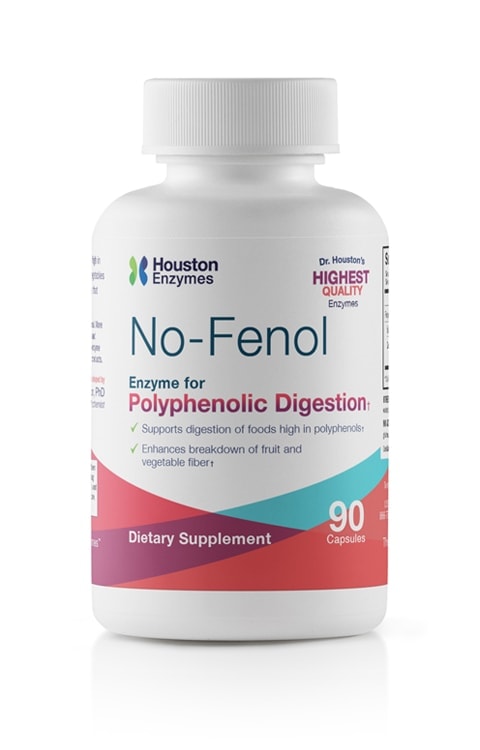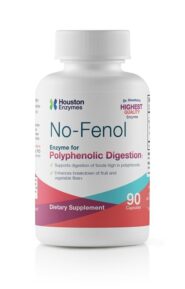No-Fenol – 90 capsules w/ cellulose filler (SCD)
£46.03 Ships from UK, VAT incl.
- Better breakdown of fruits and vegetables
- Helps support digestion of polyphenols (“phenols”)
- Tends to soften stools
No-Fenol was developed by Dr. Devin Houston in response to requests for a product that would support the digestion of fruits and vegetables, without the problems thought to be associated with polyphenolic compounds. Responses from customers indicate that for many, No-Fenol does allow the addition of these foods to the diet without complications.
All plants contain some degree of polyphenolic compounds (sometimes called “phenols”). The polyphenol structure itself is found everywhere in nature, and is essential to many of life’s processes.
Current thinking by many is that some subset of children on the autism spectrum have difficulty in the processing of polyphenolic compounds, which may present as behavioral problems and physical symptoms such as red ears and cheeks, and dark circles under the eyes. While the basic mechanism behind this phenomenon is not well defined, it is thought that perhaps the polyphenolic compounds become “trapped” in some part of a metabolic cycle, presumbably involved with various detoxification pathways.
The research literature indicates that some polyphenolic compounds are modified by the addition of carbohydrate groups to their structures, which may inhibit their crossing into cells and being metabolized.
The current hypothesis for why No-Fenol may help is through the ability of the enzymes in this product to remove the carbohydrate groups from the polyphenols, thus allowing normal processing by the detoxification pathways.
There is no evidence that No-Fenol directly modifies polyphenolic structures. Indeed, the success of No-Fenol in allowing the addition of polyphenolic foods back into the diet of children with autism may result in a re-evaluation of the basis of the polyphenol “problem”.
Xylanase is the major component of No-Fenol, and is an enzyme used to breakdown the structural components of plant cell walls, which are primarily very complex carbohydrates. Xylanase is used in the juice industry to extract more juice from fruit pulp fibers.
At least one reference indicates that polyphenolic compounds are actually increased by treatment with xylanase. Based on this reference and the fact that No-Fenol has allowed “phenol-sensitive” individuals to ingest polyphenolic foods, Houston Enzymes now believes that the polyphenol issue is much more complex than previously thought, and may not be due so much to the presence of phenols as to the specific structure of these polyphenols.
Filler
No-Fenol capsules contains cellulose/medium-chain triglyceride oil (MCT oil) as filler. MCT oil is derived from palm oil, and the cellulose is derived from European Spruce trees. The capsule is also cellulose.
Contraindications for Enzyme Supplementation
This product may not be appropriate for those with known allergies to enzyme proteins, though non-specific mold allergies do not necessarily preclude use of fungal enzymes. Consult your medical doctor for further advice, and err on the side of caution. Those with known anaphylactic allergic reactions to fungal proteins should NOT ingest fungal-derived enzymes.
| Supplement Facts |
|---|
|
Serving Size: 1 Capsule Servings per Container: 90 |
| Amount Per Serving | % Daily Value | |
|---|---|---|
| Enzyme Blend | 288 mg | * |
| Xylanase | 32,000 XU | |
| CereCalasetm (1,500 MU) Hemicellulase, beta-glucanase, phytase | 75 mg | * |
| *Daily Value Not Established | ||
| OTHER INGREDIENTS: Vegetable capsule (cellulose and water), cellulose and Medium Chain Triglycerides. No added sugar, starch, dairy, soy, wheat, yeast, gluten, nuts, artificial flavors, or animal derivatives. CereCalase® is a registred trademark of National Enzyme Company. |
||
No upper limit has been established for oral enzyme supplementation. Animal studies indicate that extremely large doses of enzymes may be ingested without toxicity or ill effect. No upper limit has been established for enzyme dosing, and animal studies found no toxicity at dosing as high as 80,000 FXU per kilogram of body weight per day for 13 weeks. No-Fenol is recommended primarily for those with known sensitivities to phenolic compounds.
A dose of ½ to 1 capsule (or 1 to 2 chewable tablets) usually suffices for most meals, but not necessarily with every meal. Some have found satisfactory results with once or twice per day dosing, indicating that optimal dosing may be dependent upon many factors. High doses can decrease firmness of stools. Decrease dose if stools become too soft – or add Zyme Prime.
You may vary the dosage of No-Fenol based on content and size of meal. Those meals higher in polyphenols may call for higher doses of No-Fenol. For reasons of practicality, no more than 3 capsules need be taken at one meal.
Only logged in customers who have purchased this product may leave a review.






Reviews
There are no reviews yet.